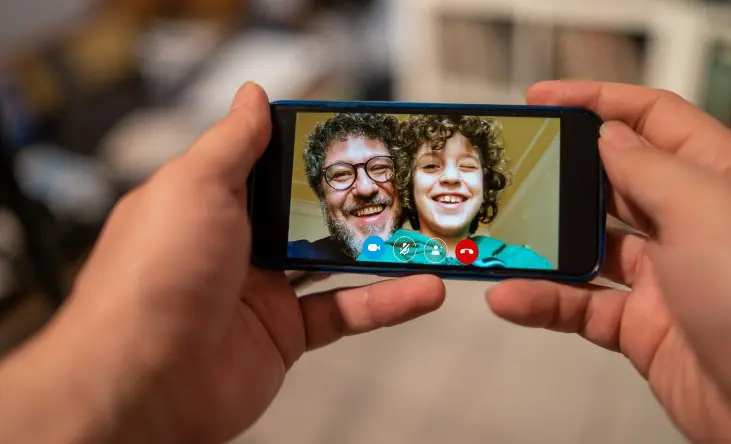Addiction expert Olga Valverde: “Social networks get us hooked because they allow us to only show one aspect of our lives”

The increasingly intensive use of these devices can pose a real threat to our well-being. The data are alarming: More than 50 percent of adolescents are considered technology addicts. This disease is associated with an increased risk of depression, isolation or even suicidal tendencies. Olga Valverde, Behavioral Neurobiologist and addiction expert at Pompeu Fabra University insists that, like with any other addiction, prevention is key.
Why do social networks get us hooked?
Social networks “get us hooked” because they offer a new way of being “visible” in the world. They provide a new way of experiencing reality. To some extent, we can manipulate what we show so as to only show one aspect of our lives, the one that we find more attractive or that we feel most satisfied with. This generates well-being, a positive, pleasant feeling, as we can have control over the image that we project of ourselves to the outside world.
What happens in our brain when we receive a like?
When we receive a like, our brain perceives it as having succeeded in achieving our aim. We like this situation, it immediately gives us a pleasant and positive feeling. It is a simple way of causing activation in our brain that directs its attention to that circumstance. As such, we continue to look for more likes, more followers and, ultimately, more success.
From a neurobiological point of view, this translates into an increase in neurochemical messengers, which control the reward circuits in our brain that respond physiologically to natural stimuli (eating, drinking, sex, personal relationships) and enable us to survive.
In some ways, they are currently a great support during lockdown and are helping us to maintain a certain “normality” with regard to social activities. In my opinion, they are a substitute for social relations and, depending on in which area they take place, they can limit the benefits of social interaction.
For example, they enable us to maintain fast, efficient and useful relationships. This is very important for professional relationships.
However, virtual interactions are lacking in some aspects that are essential to personal relationships, as we are unable to experience closeness, touch, smells, sharing the same environment and spontaneity. As such, in the context of relationships with friends or those that require greater intimacy, virtual interactions are insufficient. By way of example, it is like seeing a delicious cake through a window, only you can’t taste it.

During the addictive process, a maladaptation develops in certain circuits of our brain, particularly in those that are activated when we like something. These are the areas that control pleasure, well-being and motivation. These nerve pathways are usurped or hijacked by the substance that is consumed or by the activity that absorbs us, so that these areas of the brain stop responding to other essential stimuli, such as interpersonal relationships, eating, caring for our children or having sex, etc.
Thus, because of this adaptive dysfunction that causes addiction, the person concerned ceases to be the master of their own actions and loses their free will. They somehow become a slave to their addiction, and even if the person is aware that the drug or technology is causing problems for them, they cannot avoid seeking it out and using it. In an advanced phase, the person uses the technology or drug, for example, so as to avoid the negative effects of not using it, ultimately, of abstinence.
What are the first symptoms?
We initially carry out the activity in our free time as an escape or hobby. We subsequently realize that we are spending more and more time on the activity and continue do so even when we have to attend to our work or other obligations. This situation gradually worsens until the activity absorbs us completely.
Are we all potentially addicted to technology?
Some people are more vulnerable and others more resistant to the development of addictions. Genetic and biological factors contribute to the greater or lesser vulnerability of each person (as is also the case with other illnesses). Environmental factors also have a huge impact. The environment is fundamental both in order to favor and to protect us from the development of an addiction.
Adolescents are very vulnerable because their brain is still maturing and because this stage of life implies a certain autonomy with regard to family life and the norms that were accepted in stages of childhood.
Lockdown, social isolation, uncertainty, etc. Do these factors make the problem worse?
Of course they do. Earlier, I mentioned that environmental factors can bring about vulnerability. It is known that exposure to stress, especially if it is maintained over a period of time or is very intense, is one of the factors that contribute to the development of addictions or relapse when the person concerned tries to give them up. All of these situations mentioned are difficult to manage emotionally.
We recently spoke with Gabriela Paoli about the importance of prevention, especially among young people. Is it more effective to work on prevention than it is on treating the disease?
It most definitely is. The best treatment for addictions is to work on prevention, in particular, aimed at young people. Give them clear and real information in their own language and provide them with tools to enable them to implement their life expectations and ambitions. Uncertainty and the lack of personal and professional prospects are situations that damage self-esteem and often lead us to seek an escape in drug or technology use.
We have heard you explain that impulsivity is a character trait that makes us more vulnerable to drug use, but also to technology addiction. Why does this happen?
Yes, it is true that impulsivity is a character trait that makes us more vulnerable. It is also a trait that is more accentuated in our adolescence and youth. Impulsive people are less reflective and can make hasty decisions. Acting on impulse often leads us to make wrong decisions. In addition, impulsive people may be people who seek risky feelings and engage in risky behavior. All of this makes it easier, in addition, to experiment with drugs and fall into drug addiction or addiction to technology use.
